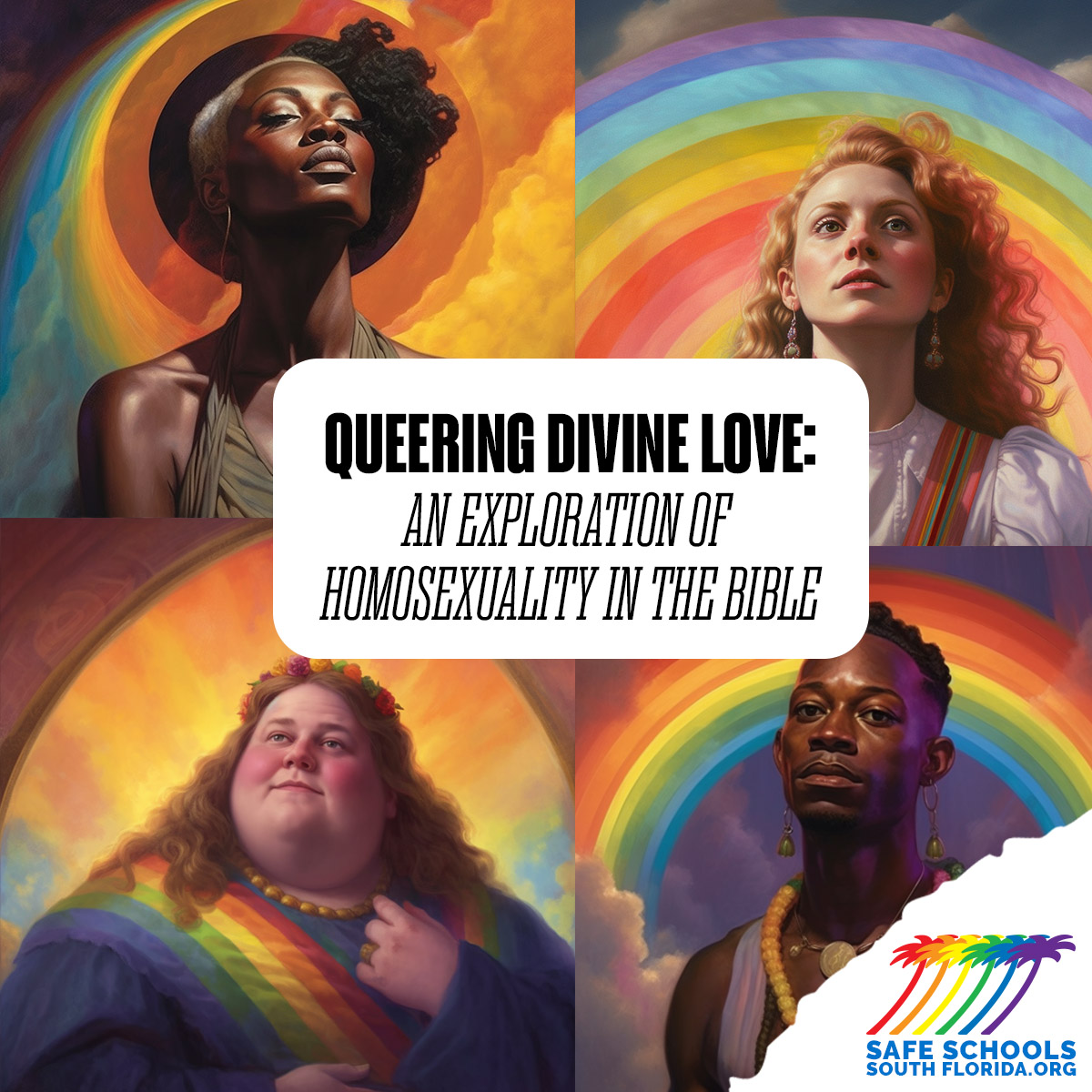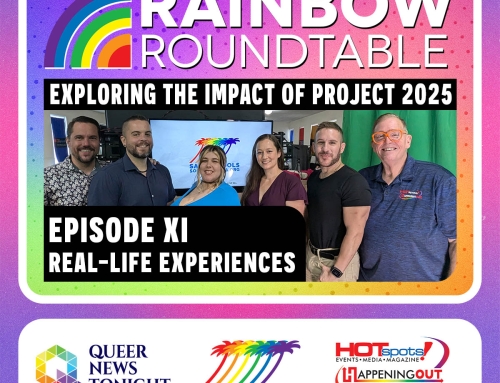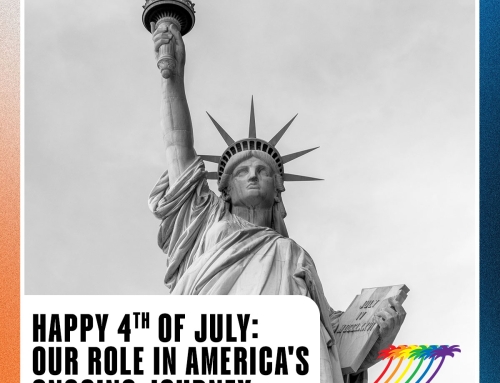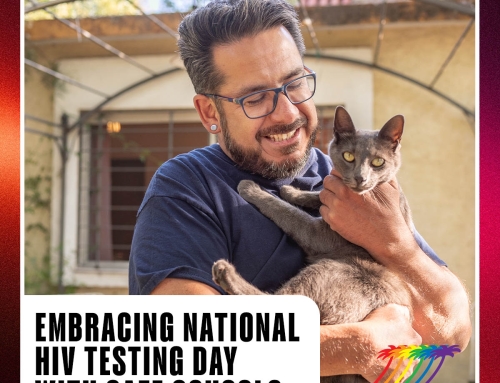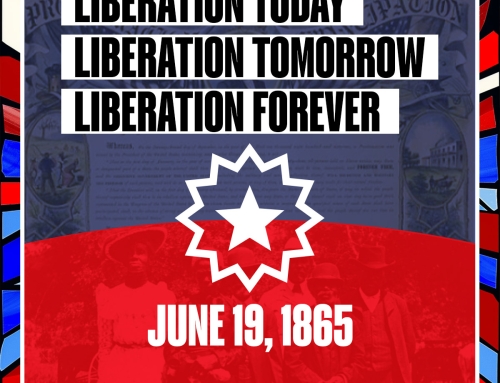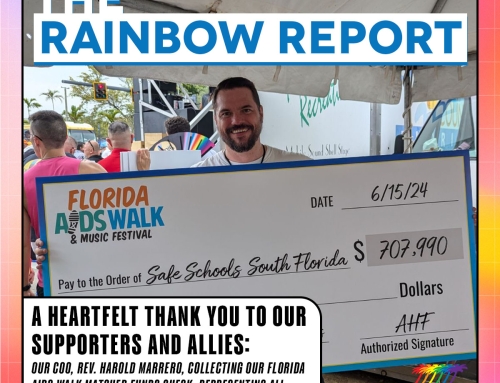Trigger Warning: This blog post discusses misinterpretations of Biblical texts that have historically been used to marginalize and harm the LGBTQ+ community. It aims to provide a more inclusive and affirming interpretation.
Often seen as a rigid roadmap, the Bible is a canvas – rich, expansive, and inviting interpretation. As we explore Biblical verses often misused against our queer siblings, we’ll endeavor to shed light on a more loving and inclusive understanding of these texts.
Sodom and Gomorrah
“But before they lay down, the men of the city, the men of Sodom, both young and old, all the people to the last man, surrounded the house; and they called to Lot, ‘Where are the men who came to you tonight? Bring them out to us, so that we may know them.'” – Genesis 19:4-5
Genesis 19 recounts the tragic tale of Sodom and Gomorrah, frequently misinterpreted as a condemnation of homosexuality. This verse illuminates a grievous story of inhospitality and violence. The Divine’s displeasure was directed towards the lack of compassion, not towards expressions of love. Embracing love and empathy are divine traits that we should aspire to cultivate.
Leviticus Holyness Code
“You shall not lie with a male as with a woman; it is an abomination.” – Leviticus 18:22
“If a man lies with a male as with a woman, both of them have committed an abomination; they shall be put to death; their blood is upon them.” – Leviticus 20:13
In the book of Leviticus, two verses are often misappropriated to label same-sex relationships as abominations. Leviticus 18:22 and 20:13 are both steeped in the cultural context of ancient times and primarily address ritual purity rather than genuine expressions of love between people. Love is not an abomination; instead, it’s a divine gift to be cherished and shared.
Paul’s Letters
“For this reason, God gave them up to degrading passions. Their women exchanged natural intercourse for unnatural, and in the same way, the men, giving up natural intercourse with women, were consumed with passion for one another. Men committed shameless acts with men and received in their own persons the due penalty for their error.” – Romans 1:26-27
Paul’s letter to the Romans is also often misunderstood and misused against queer people. Paul’s concern in Romans 1:26-27 was idolatry, not same-gender relationships. His critique is aimed at non-consensual and exploitative behaviors, not loving, committed relationships. A closer reading will also uncover that Paul’s real problem with the early Roman church was their judgment towards people who they had labeled as “othered” due to created social rules of the time. Paul’s call is for those early followers of Christ to embrace the other and, through love, transform them into friends. Remember that you are not unnatural; you are wonderfully crafted in the divine image.
“Do you not know that wrongdoers will not inherit the kingdom of God? Do not be deceived! Fornicators, idolaters, adulterers, male prostitutes, sodomites, thieves, the greedy, drunkards, revilers, robbers—none of these will inherit the kingdom of God.” – 1 Corinthians 6:9-10
“This means understanding that the law is laid down not for the innocent but for the lawless and disobedient, for the godless and sinful, for the unholy and profane, for those who kill their father or mother, for murderers, fornicators, sodomites, slave traders, liars, perjurers, and whatever else is contrary to the sound teaching.” – 1 Timothy 1:10
Likewise, 1 Corinthians 6:9-10 and 1 Timothy 1:10 have often been misinterpreted. These verses list several vices without clear context. The meanings of these lists have been interpreted and translated in various ways over centuries. If you hear a version of these verses that include the word “homosexual,” you are undoubtedly encountering a theological agenda that has tried to force these verses to reflect their homophobia and prejudice. It is also important to remember that the word “homosexual” is relatively modern and does not exist anywhere in the oldest manuscripts of the Bible. The ancient Greek words used in both verses above are also unknown and heavily debated by modern scholars. Your identity is not a vice but a vibrant and beautiful expression of the Divine’s creation.
What Does Sodomite Mean?
“Likewise, Sodom and Gomorrah and the surrounding cities, which, in the same manner as they, indulged in sexual immorality and pursued unnatural lust, serve as an example by undergoing a punishment of eternal fire.” – Jude 1:7
Jude 1:7 references ‘unnatural desire,’ which is commonly misinterpreted. This verse reflects the story of Sodom with its focus on violent desires, not committed same-sex relationships. In addition, the word “sodomite” has traditionally been used as a label for queer people. Yet, in the Bible, a sodomite is anyone from the city of Sodom, and their sins, as stated above, are directly tied to the inhospitable behaviors they directed toward their neighbors. The Book of Ezekiel clearly states, “This was the guilt of Sodom: prideful inhospitable behavior, excess of food, and prosperous ease but did not aid the poor and needy. They were haughty and did abominable things before God; therefore, God removed them when God saw it.” Nowhere in those verses do Biblical writers refer to consensual loving same-sex relationships. You are not a perversion; instead, you are cherished and precious in the Divine’s sight.
God Is Queer
“So God created humans in Their image, in the image of God, they created them.” – Genesis 1:27 (Reimagined)
Lastly, let us revisit Genesis 1:27, where we see a Divine image reflected in humanity’s rich spectrum of gender and sexual identities. This suggests that the Divine is as diverse as humanity itself, embracing and reflecting the range of identities we understand as queerness. It is essential to know that the original verse above does use gender pronouns for God and humanity. However, those words were written by ancient people without a modern understanding of human sexual and gender expression. So, we reclaim that queer identity for God, as it is perfectly expressed in the fullness of our shared humanity. You are not an error but a reflection of the Divine’s image.
Where Do We Go From Here?
In our journey through the Bible, we challenge you to question, to wrestle with the text, and seek out affirming and inclusive communities. A queer faith isn’t about accepting everything at face value but an inward journey to unearth the truth that resonates with your authentic self.
As queer youth, know that the One who sparked life into existence, who spun galaxies into the cosmos, loves you with a boundless love that transcends human comprehension. You are fully embraced by a limitless, timeless, and unchanging love. This love flows within you as an internal source of strength, love, and authenticity.
Your queer identity is not a stumbling block to the Divine’s love but a testament to it. Just as a prism refracts white light into many colors, so does the Divine love refract through us, painting the world in a spectrum of experiences, identities, and expressions.
May this knowledge inspire you to live your truth. Your authenticity is not just a personal triumph but a divine one as well. The courage you embody by being true to yourself is a radiant reflection of the Divine’s love for diversity, vibrancy, and authenticity. You are a vital part of this cosmic dance, and your every step contributes to the intricate choreography of creation.
At Safe Schools, we affirm that you, in your wholeness and authenticity, are dearly loved by the Divine. This affirmation is not despite your queerness but inclusive of it. Love boldly with no reservations, live authentically, and let your life be a living testament to the Divine’s love and affirmation. Embrace your place in the cosmos, for it is not just a space that you occupy but a stage on which you are free to express your unique dance of divine love.
By: Pastor Harold Marrero
Chief Operating Officer
We encourage you to share this information with friends, fellow teachers, and allies and join us in bringing awareness to our efforts. Your support is essential for our ongoing work to create safe spaces for all students, regardless of ethnicity, gender, sexual orientation, or expression. Please consider donating to Safe Schools so that we can continue advocating for inclusivity and diversity within the education system.

